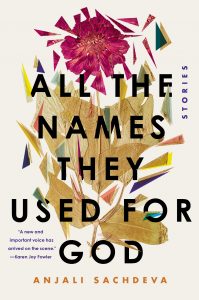 Collections often contain one or two stories in particular (or more, that’s always a wonderful bit of luck) that linger with their reader; a story or two that simultaneously satisfies and leaves one wanting more. In the case of All the Names They Used for God, that story, for me, was “Glass-Lung.” Read the summary below; that mention of the worker in Carnegie’s mill? That one. Days after reading the story I still find myself thinking about that workman and his daughter. Consider how few pages short stories spread across, and yet “Glass-Lung” took me inside that steel mill, through the halls and storage rooms of a museum, to Egypt for a dig. Transporting is most certainly the word. And so, biased, I would suggest picking up this book if only to read that story. (I suspect, in the end, you’d wind up reading most of the stories if not all of them, because this is indeed a solid collection, from start to finish.)
Collections often contain one or two stories in particular (or more, that’s always a wonderful bit of luck) that linger with their reader; a story or two that simultaneously satisfies and leaves one wanting more. In the case of All the Names They Used for God, that story, for me, was “Glass-Lung.” Read the summary below; that mention of the worker in Carnegie’s mill? That one. Days after reading the story I still find myself thinking about that workman and his daughter. Consider how few pages short stories spread across, and yet “Glass-Lung” took me inside that steel mill, through the halls and storage rooms of a museum, to Egypt for a dig. Transporting is most certainly the word. And so, biased, I would suggest picking up this book if only to read that story. (I suspect, in the end, you’d wind up reading most of the stories if not all of them, because this is indeed a solid collection, from start to finish.)
About the collection:
“Spanning centuries, continents, and a diverse set of characters, these alluringly strange stories are united by each character’s struggle with fate. In a secret, subterranean world beneath the prairie of the Old West, a homesteader risks her life in search of a safe haven. A workman in Andrew Carnegie’s steel mills is turned into a medical oddity by the brutal power of the furnaces—and is eventually revitalized by his condition. A young woman created through genetic manipulation is destroyed by the same force that gave her life.
Anjali Sachdeva demonstrates a preternatural ability to laser in on our fears, our hopes, and our longings in order to point out intrinsic truths about society and humanity. “Killer of Kings” starts with John Milton writing Paradise Lost and questions the very nature of power—and the ability to see any hero as a tyrant with just a change in perspective. The title story presents a stirring imagining of the aftermath of the kidnapping of Nigerian schoolgirls by Boko Haram that leaves us pondering what is lost when we survive the unsurvivable. And in “Pleiades,” genetically modified septuplets are struck by a mysterious illness that tests their parents’ unwavering belief in the power of science.
Like many of us, the characters in this collection are in pursuit of the sublime, and find themselves looking not just to divinity but to science, nature, psychology, and industry, forgetting that their new, logical deities are no more trustworthy than the tempestuous gods of the past. Along the way, they walk the knife-edge between wonder and terror, salvation and destruction. All the Names They Used for God is an entrancing work of speculative fiction that heralds Anjali Sachdeva as an invigorating, incomparable new voice.”


